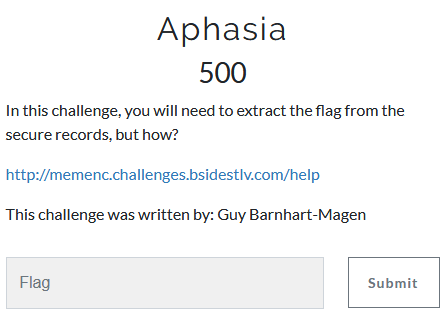Aphasia
- Category: Cryptography
- 500 Points
- Solved by the JCTF Team
Description

Solution
We access the help API and get the following definitions:
root@kali:/media/sf_CTFs/bsidestlv/Aphasia# curl http://memenc.challenges.bsidestlv.com/help
{
"GET /{credID}":"Check existance and length of record at cred ID (all numbers in hex)",
"GET /read/{credID}:{len}":"Retrieve len bytes of non secure data from record at cred ID (all numbers in hex)",
"GET /hash/{credID}:{len}:{offset}":"Retrieve hash bytes of secure data from record at cred ID (all numbers in hex)",
"GET /help":"Show API help"
}Let's try the APIs out.
We start with the "get details" API:
root@kali:/media/sf_CTFs/bsidestlv/Aphasia# curl http://memenc.challenges.bsidestlv.com/0
{"header":"nonSecure","length":"14","data":""}
root@kali:/media/sf_CTFs/bsidestlv/Aphasia# curl http://memenc.challenges.bsidestlv.com/a
{"header":"nonSecure","length":"0b","data":""}
root@kali:/media/sf_CTFs/bsidestlv/Aphasia# curl http://memenc.challenges.bsidestlv.com/999
{"header":"Error","length":"","data":""}Let's try to read from the first record:
root@kali:/media/sf_CTFs/bsidestlv/Aphasia# curl http://memenc.challenges.bsidestlv.com/read/0:1
{"header":"nonSecure","length":"14","data":"8e"}
root@kali:/media/sf_CTFs/bsidestlv/Aphasia# curl http://memenc.challenges.bsidestlv.com/read/0:2
{"header":"nonSecure","length":"14","data":"8ec1"}
root@kali:/media/sf_CTFs/bsidestlv/Aphasia# curl http://memenc.challenges.bsidestlv.com/read/0:3
{"header":"nonSecure","length":"14","data":"8ec162"}We can read from this record, marked as "Non-Secure", using this API.
What does the hash API give us? We read the hash of 1 byte of data from record 0, offsets 0, 1, and 2.
root@kali:/media/sf_CTFs/bsidestlv/Aphasia# curl http://memenc.challenges.bsidestlv.com/hash/0:1:0
{"header":"nonSecure","length":"20","data":"7572920c2479d86b55ed3d99264979c35f97652f33ba9e73f2e40b474984a9c9"}
root@kali:/media/sf_CTFs/bsidestlv/Aphasia# curl http://memenc.challenges.bsidestlv.com/hash/0:1:1
{"header":"nonSecure","length":"20","data":"d0f631ca1ddba8db3bcfcb9e057cdc98d0379f1bee00e75a545147a27dadd982"}
root@kali:/media/sf_CTFs/bsidestlv/Aphasia# curl http://memenc.challenges.bsidestlv.com/hash/0:1:2
{"header":"nonSecure","length":"20","data":"81b8a03f97e8787c53fe1a86bda042b6f0de9b0ec9c09357e107c99ba4d6948a"}These are the SHA256 values for 8e, c1 and 62 respectively:
root@kali:/media/sf_CTFs/bsidestlv/Aphasia# echo -n "8e" | sha256sum
7572920c2479d86b55ed3d99264979c35f97652f33ba9e73f2e40b474984a9c9 -
root@kali:/media/sf_CTFs/bsidestlv/Aphasia# echo -n "c1" | sha256sum
d0f631ca1ddba8db3bcfcb9e057cdc98d0379f1bee00e75a545147a27dadd982 -
root@kali:/media/sf_CTFs/bsidestlv/Aphasia# echo -n "62" | sha256sum
81b8a03f97e8787c53fe1a86bda042b6f0de9b0ec9c09357e107c99ba4d6948a -So we can use the "hash" API to deduce the contents of a non-secure record, giving us what we read using the "read" API.
Now let's go find a secure record and try the same trick:
root@kali:/media/sf_CTFs/bsidestlv/Aphasia# curl http://memenc.challenges.bsidestlv.com/12
{"header":"Secure","length":"05","data":""}
root@kali:/media/sf_CTFs/bsidestlv/Aphasia# curl http://memenc.challenges.bsidestlv.com/read/12:0
{"header":"Secure","length":"05","data":"Secure data, use hash interface"}
root@kali:/media/sf_CTFs/bsidestlv/Aphasia# curl http://memenc.challenges.bsidestlv.com/hash/12:1:0
{"header":"Secure","length":"20","data":"9327ca99aaea2b8f025e61e53b64fcdd38d7e5c0ad893c4ed271d3622ac14548"}
root@kali:/media/sf_CTFs/bsidestlv/Aphasia# for i in `seq 0 256`; do chr=$(printf "%02x" $i); echo -n $chr | sha256sum &
& echo $chr; done | grep 9327ca99aaea2b8f025e61e53b64fcdd38d7e5c0ad893c4ed271d3622ac14548 -A1
9327ca99aaea2b8f025e61e53b64fcdd38d7e5c0ad893c4ed271d3622ac14548 -
f7Looks like this works for secure record as well.
Using the following script, we can extract all the secure records:
import requests
import hashlib
import string
URL = "http://memenc.challenges.bsidestlv.com"
def get_details(record_id):
r = requests.get("{}/{:x}".format(URL, record_id))
j = r.json()
if j["header"] == "Error":
return None
return j
def get_data(record_id, length):
r = requests.get("{}/read/{:x}:{:x}".format(URL, record_id, length))
j = r.json()
if j["header"] == "Error":
return None
return j
def get_hash(record_id, length, offset):
r = requests.get("{}/hash/{:x}:{:x}:{:x}".format(URL, record_id, length, offset))
j = r.json()
if j["header"] == "Error":
return None
return j
sha256_map = {}
for c in range(256):
hex_repr = '{:02x}'.format(c)
sha256_map[hashlib.sha256(hex_repr.encode()).hexdigest()] = hex_repr
record_id = -1
while True:
record_id += 1
details = get_details(record_id)
if details is None:
break
if details["header"] == "nonSecure":
continue
msg = ""
offset = 0
while True:
res = get_hash(record_id, 1, offset)
if res is None:
print ("Record #{}: '{}'".format(record_id, msg))
break
msg += sha256_map[res["data"]]
offset += 1Running it, we get:
root@kali:/media/sf_CTFs/bsidestlv/Aphasia# python3 extract.py
Record #2: '425369646573544c567b54686973207761732066756e217d'
Record #12: '425369646573544c567b54686973207761732066756e217d'
Record #16: '8e4f0ce5fdebae87da660bc6ebf1cd5d0cf8a6380e4c88'
Record #17: '425369646573544c567b54686973207761732066756e217d'
Record #18: 'f763f936ad'
Record #21: '425369646573544c567b54686973207761732066756e217d'
Record #28: '425369646573544c567b54686973207761732066756e217d'
Record #29: '425369646573544c567b54686973207761732066756e217d'
Record #31: '425369646573544c567b54686973207761732066756e217d'
Record #36: '425369646573544c567b54686973207761732066756e217d'
Record #47: '425369646573544c567b54686973207761732066756e217d'
Record #49: '425369646573544c567b54686973207761732066756e217d'
Record #56: '425369646573544c567b54686973207761732066756e217d'
Record #57: '425369646573544c567b54686973207761732066756e217d'
Record #66: '425369646573544c567b54686973207761732066756e217d'
Record #67: '2c1f56e75c38ce06'
Record #74: '425369646573544c567b54686973207761732066756e217d'
Record #77: 'd1'
Record #78: '710cf6da35d44c81365c5ca96ac5b379b5df85c80dfeddac6709ff0a'
Record #83: '425369646573544c567b54686973207761732066756e217d'
Record #85: '425369646573544c567b54686973207761732066756e217d'
Record #86: '425369646573544c567b54686973207761732066756e217d'
Record #87: '425369646573544c567b54686973207761732066756e217d'
Record #92: '425369646573544c567b54686973207761732066756e217d'
Record #93: '425369646573544c567b54686973207761732066756e217d'
Record #100: 'd474bb75f4e6ae882a0bb15ecdfd'
Record #101: '425369646573544c567b54686973207761732066756e217d'
Record #102: '13276f3f55551cc4b56f1eff2c9bcb78a590e6e3bb'
Record #115: '12b09617afb78ccbc6d776cb15ab7712d5dbc446de1d'
Record #124: '425369646573544c567b54686973207761732066756e217d'
Record #125: '425369646573544c567b54686973207761732066756e217d'One value seems to repeat itself many times, what does it represent?
root@kali:/media/sf_CTFs/bsidestlv/Aphasia# echo 425369646573544c567b54686973207761732066756e217d | xxd -p -r
BSidesTLV{This was fun!}